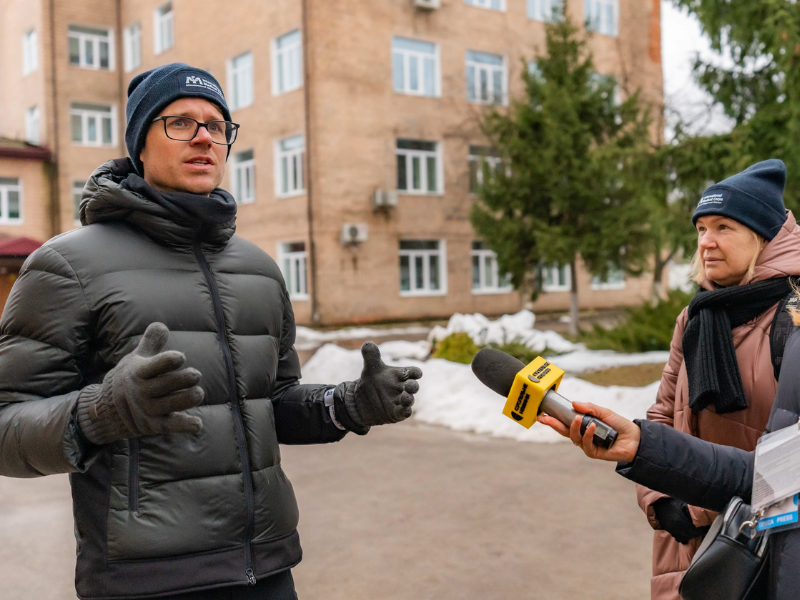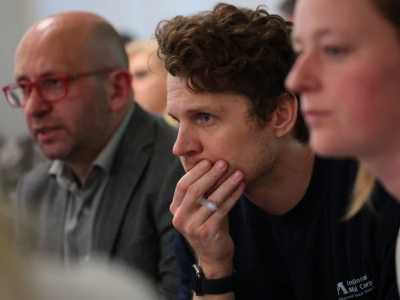SPHTM graduate credits persistence as key to his work in Ukraine

Tulane School of Public Health and Tropical Medicine alumnus Andrew Ryan (MPH IHD ’12) has wanted to work in international humanitarian aid since he was 22. While he wouldn’t have wished for the conflict, the war in Ukraine has served as his proving ground.
Ryan has now spent over a year working as field site coordinator for International Medical Corps in the Chernihiv region of Ukraine, handling emergency response and program development. And his experience, to say the least, has been eye-opening.
Embedded in the country since May of 2022 (a couple of months after the war began), Ryan has been charged with running four regions in the middle and western parts of the country, working in the hospital system with the Ministry of Health directly.
Challenges have revolved around unreliable infrastructure due to bombings and attacks. Things that people take for granted, like power, or even heat in the winter, aren’t always a given.
Adjusting to those conditions to get day-to-day work done is challenging enough. But finding a path forward in terms of helping people with workable plans has added an entirely different level of challenge.
Ryan has been buoyed by the resolve of the people around him.
“I think the main takeaway for me [last] winter was how quickly people adjust,” Ryan said.
“These are people who know how to suffer. It's a sad thing. But they're experts at it. And they dealt with it. And they deal with it with a level of grace that I haven't witnessed too much in my life, to be honest.”
— Andrew Ryan
“In general, Ukrainian people are wildly resilient,” he added while running through the volume of difficulties the people in the region have experienced (from war, to Soviet rule, to Chernobyl). “They've been through a lot. … But these are people who know how to suffer. It's a sad thing. But they're experts at it. And they dealt with it. And they deal with it with a level of grace that I haven't witnessed too much in my life, to be honest.”
Part of Ryan’s work has seen the rebuilding of hospitals that were directly bombed, establishing five major new health care facilities, and the construction of several smaller ones as well.
But changing conditions can produce different needs. Ryan has assisted with programs covering the spectrum of mental health, violence prevention, nutrition for infants and mothers, water sanitation, and hygiene … with those needs varying by region or even timing.
“We're running programs all over the country, focused on different things based on the context. So, in the frontline areas, it's mobile medical units. There's some mental health component, but it's humanitarian assistance, it's delivering water and delivering essential items, sanitation, hygiene kits, all of these types of things. In my regions, right now, it's recovery. And then the other regions are more focused on internally displaced people and providing for them in one way or the other.”

“It's been a very interesting, incredibly challenging project across the whole country.”
Ryan recalled a specific recent incident, where a large missile strike hit a community in which he had spent a great deal of time personally. The attack killed seven and injured 185, but he was gratified that his team had previously gone into the community to provide doctors the tools they needed to help the people in need following the attack.
“I'm really proud that we were able to jump in so quickly. I mean, we came in right after they were liberated, and rebuilt all this stuff. And I know that those people got the care they needed.”
Ryan got his start with International Medical Corps in 2020 during the height of COVID-19, helping to set up emergency surge-capacity areas at hospitals in places like Chicago, Texas, and Los Angeles. But he credits the skills he gained – and the connections he made – at Tulane to help him land what, for him, is a dream job.
“I think what [my degree] did is give me an overview of the international humanitarian system, and humanitarian response in general,” says Ryan. “The international health and development [program] was kind of a wide general overview of all the different pieces of it. It wasn't really the specialization that some other degrees are. And that's kind of what my job is.”
“It wasn't easy,” Ryan admits. “I will say that mine was not a straight line. I dreamt of being an international humanitarian since I was 22. Now, there was a long time when I gave up on that dream, and then it came back around. And so I would just say persistence is the key. And really, those personal connections do matter.”
